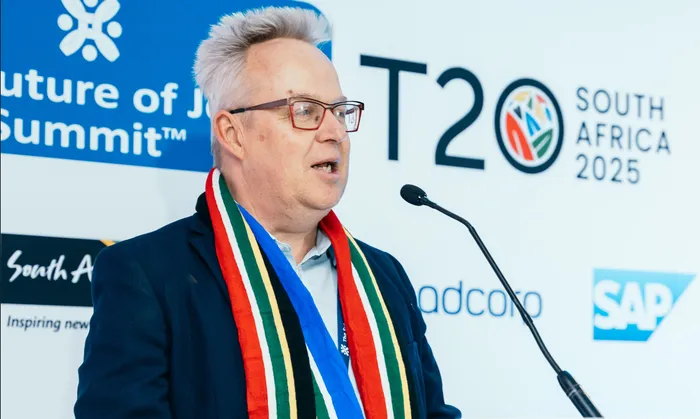Transforming Trump’s G20 snub into a strategic advantage for South Africa - Dr Nik Eberl

Dr Nik Eberl is the Founder & Executive Chair: The Future of Jobs Summit™ (Official T20 Side Event) .He will be writing a regular column in Business Report.
Image: Supplied
The announcement by US President Donald Trump that South Africa will be “uninvited” from the 2026 G20 Summit is, at face value, a diplomatic provocation. But beneath the headlines lies a far more consequential opportunity: the chance for South Africa - with its business leadership at the forefront - to redefine its global narrative, champion multilateralism and strengthen its position as a bridge between the West and the Global South.
Moments like these are where national brands, economic futures and geopolitical identities are shaped. South Africa now has an opportunity not just to weather the storm, but to lead through it.
The G20 Is Not a Party Invitation — And Business Knows It
The suggestion that a full member can be “disinvited” misunderstands the G20’s nature. It is not a club of personal invitations; it is a forum of fixed members whose presence is integral to the legitimacy of the whole.
For South African business - deeply integrated into global supply chains, capital markets and investment networks - predictability and rules-based cooperation are not optional. They are the bedrock of economic growth.
An unstable or arbitrary G20 erodes the very certainty that business relies on to invest, expand and employ. Thus, this is not just a geopolitical misstep. It is a direct challenge to the environment in which South African companies operate.
Seizing the Moral High Ground Strengthens Competitiveness
By asserting itself as a defender of multilateralism, South Africa strengthens more than its political brand - it strengthens its economic brand. Global investors watch for three qualities in emerging markets:
- Stability
- Predictability
- Principle-based leadership
A measured, principled response to Trump signals all three. This reassures markets, demonstrates institutional maturity, and differentiates South Africa from peers grappling with political volatility.
A Rallying Message for the Global South — and a Market Opportunity
Most emerging economies are quietly alarmed by the precedent this sets. If a full G20 member can be excluded at whim, then the entire rules-based international economic order becomes optional.
South Africa can lead a Global South coalition around a message that resonates economically as much as politically: “If one member’s participation can be revoked for political theatre, investor confidence in all of us is at risk.”
This opens the door for new trade partnerships, deeper BRICS+ integration, intra-African investment flows and South-South collaboration - areas where our private sector stands to gain significantly.
The Business Sector as Diplomatic Multiplier
Business leaders are powerful validators of a nation’s credibility. When the private sector speaks with a unified, non-partisan voice, governments and global markets listen. South African business can play three critical roles:
1 The Global Messenger
Companies operating internationally - from mining and finance to tech and retail - can convey a consistent message across global markets: South Africa remains stable, principle- driven and an advocate for predictable international cooperation.
2 The Domestic Unifier
Business can help ensure the national response remains calm and cohesive. Uncertainty is the enemy of investment; unity is the antidote.
3 The Investor Confidence Anchor
A collective business response - emphasising continuity, economic strength and policy consistency - can counteract any negative market reaction triggered by political noise. Business, in effect, becomes South Africa’s soft-power amplifier.
Avoiding a US–SA Business Rift
Crucially, South Africa must avoid framing this as an anti-American stance. The US is one of our largest investors, trading partners and innovation collaborators. Framing matters. This is not: South Africa vs. America. This is: South Africa defending the norms that underpin global business confidence. That distinction protects commercial relationships, cross-border investment and long-term partnerships.
Win the Narrative Regardless of the Outcome
Whether the US reverses the decision or not, South Africa - and its business sector - can still win. If South Africa participates in Miami, the narrative becomes: “Principle prevailed. The G20 remains intact thanks to South Africa’s leadership.”
If South Africa remains excluded, the narrative becomes, “South Africa stood firm against unilateralism—strengthening its alliances, economic partnerships and leadership in the Global South.” Either way, our national and economic brand grows if the response is coordinated, confident and anchored in shared values.
A Defining Moment for Business and Government Collaboration
This is not just a diplomatic incident. It is a test of South Africa’s strategic identity and economic resilience. Handled correctly - with business and government aligned - this becomes a platform to position South Africa as:
- the bridge-builder between global blocs
- the voice of sovereign equality
- the defender of rules-based cooperation
- the advocate for stable economic systems
- the champion of emerging-market interests
In a world drifting towards fragmentation, business has as much to gain from this leadership posture as the state itself. Because when a nation responds with principle, clarity and unity, both its political brand and its economic future grow stronger.
South Africa is being tested. If business and government stand together, South Africa can do more than pass the test—it can lead.
Dr Nik Eberl is the founder and executive chair: The Future of Jobs Summit™ (Official T20 Side Event). He is also author: Nation of Champions: How South Africa won the World Cup of Destination Branding.
*** The views expressed here do not necessarily represent those of Independent Media or IOL.
BUSINESS REPORT